Flicking through it, On Taiwan (台灣論) may look little different from hundreds of comic books available on the market. But this hefty volume by Japanese author Kobayashi Yoshinori (小林善紀) is nothing less than a modern history of Taiwan in comic book format and has aroused a storm of debate over the authors political views and his representation of history.
The Japanese edition of On Taiwan sold 250,000 by the end December 2000 after its November launch and unleashed a storm of controversy. Within two days of its Chinese-language version's release in Taiwan last week, scholars and politicians have begun to lash out at the book. Some say the book indicates a resurgence of Japanese militarism and call for the banning of the book, while others say that its portrayal of the Chinese people is insulting. Still others have spoken up for the book, saying it offers a chance for contemporary youth to understand the old Taiwan spirit.
Kobayashi already has a reputation as one of Japan's most controversial cartoonists and political commentator and has often been labeled a right-winger. His previous book, On War (戰爭論), another hybrid of the comic format with political commentary, triggered protests over its speculation as to whether the Nanking Massacre actually occurred. In On Taiwan, he takes similarly extreme positions.
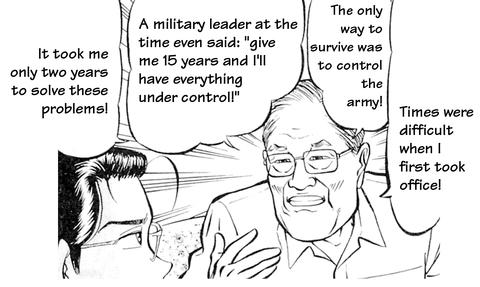
Basically, On Taiwan is a book about Taiwan's history, culture and national identity based on Kobayashi's observations and interviews with high rank politicians such as Chen Shui-bian (陳水扁) and Lee Teng-hui (李登輝), as well as everyday Taiwanese. Kobayashi also gives his interpretation of major events such as the 228 incident, the white terror period, the trouble between mainlanders and Taiwanese, the 2000 presidential election, James Soong's financial disputes with the KMT, and brings the story right up to President Chen Shui-bian's difficulties since he took power. All this information is presented in a lively, somewhat exaggerated comic book style.
But the book cover, both in the Japanese and Chinese edition, gives a hint about where the author is coming from. The cover of the book's Chinese version is dominated by the image of a peanut, a symbol of the Taiwan spirit, surmounted by a Japanese Samurai. And on the back cover, a peanut that has been split open is filled with white rice, a red plum in the center, an image easily associated with the Japanese national flag. For Kobayashi the Japanese spirit is preserved in Taiwan, especially among Taiwanese over 60.
Finding a great leader
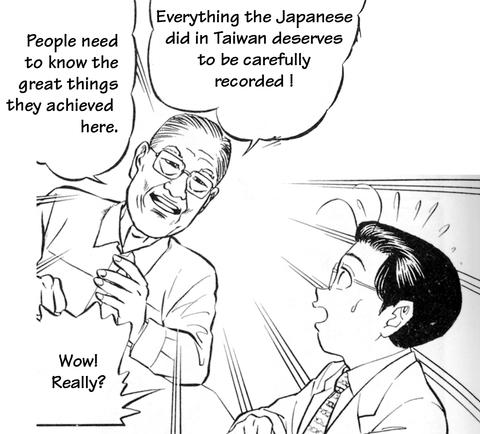
During the course of three interviews with Lee Teng-hui, and Lee's pro-independence friends Shi Wen-lung (許文龍) and Ho Chih-ming (何既明), Kobayashi says he found these men to have a typical Japanese virtue -- commitment to public interest and the annihilation of self interest. The book repeatedly praises Lee as a great leader who devoted himself to Taiwan.
For example, Kobayashi presents Lee has telling him that he joined the KMT for purely strategic reasons, saying, "I joined KMT mainly to save Taiwan's agriculture. In fact, I loathed the KMT. I was called to the Garrison Headquarters everyday for non-stop questioning about my background. It was because Chiang Ching-kuo (蔣經國) wanted to hire me," Lee is quoted as saying. Lee's strategic arguments about Taiwan's position -- from "political entity" to "Taiwan sovereignty" to "special state-to-state" -- is seen by Kobayashi as his commitment to pursuing Taiwan's national interests. The DPP's accession to power is attributed to Lee's pursuit of democracy in Taiwan over his own interests.
In the book, Kobayashi has Lee say, "what you've seen in me is all due to Japanese heritage." Lee is also quoted in the book as saying, "if not for Japan's 50 years of rule, Taiwan would be as undeveloped as Hainan island (海南島)."
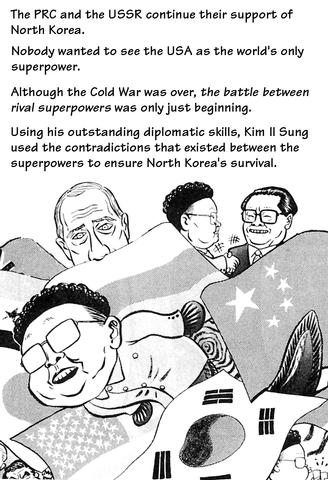
Japanese links
Kobayashi is critical of the Japanese government's attitudes towards Taiwan. He called Japan's foreign minister "stupid" and "limp" for caving in to Chinese pressure in refusing a visa for Lee Teng-hui to visit Japan. He also criticizes Japan's lack of patriotism, saying, "the government educates the youth to become a global citizen instead of a [Japanese] citizen, but this makes our youth aimless, only seeking selfish ends," Kobayashi writes in the book.
"It is not a book that tells Japanese about Taiwan. It is, rather, a book criticizing Kobayashi's own country -- Japan -- by looking at Taiwan," said Lee Yung-chih (李永熾), history professor at National Taiwan University who is an expert on Japan history and Taiwan history.
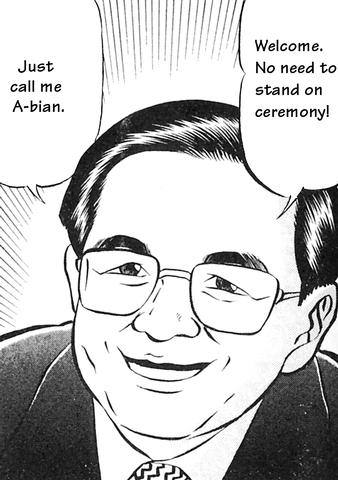
According to Shih Cheng-feng (施正鋒), an ethnic relations scholar at Tamkang University, Kobayashi is like a member of a Japanese diaspora searching for a Japan he can identify with. "And he found it in Taiwan, in the Japanese language some Taiwanese use and the Japan spirit of the Taiwanese people," says Shih.
Independence links
Kobayashi's pro-Taiwan, anti-China perspective obviously takes a friendly attitude toward Taiwan independence. The book opens with Chen Shui-bian's presidential election victory. He describes Chen's victory as a first step in departing from the Chinese world and taking a path towards the birth of the nation. He also spends two chapters talking about Taiwan's national identity and national status.
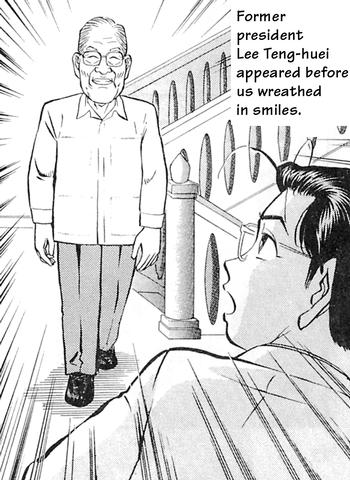
Pictures courtesy of Avant Garde Publishing
"Kobayashi concludes that nationalism does not come from blood ties or race homogeneity. Rather, it is nurtured from the common history and culture on the same plot of land," said Lee Yung-chih. This is the foundation of Kobayashi's interest in the concerns and aspirations of Taiwan nationalism.
But Kobayashi's concern is tinged with an emphasis on Japanese influence. When he describes Taiwan's history under Japanese colonialism, the focus is on the modern infrastructure Japan gave Taiwan, such as the Chianan canal (嘉南大渠) and the development of Penglai rice (蓬萊米). This belief in Japan's contribution even leads him to question the reality of people's suffering and their deprivation of rights under Japanese rule.
Distored views
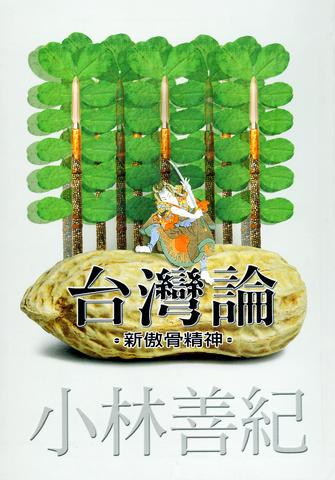
"Japan can be said to be the colonial country with the most conscience," he says in the book. "Japanese rule [over Asian countries] during the Pacific War could have brought greater well-being to Asian people." He is not even beyond denying the suffering of "comfort women" during WWII, saying most joined up "of their own free will."
It is suggestions such as these that have triggered most of the condemnation against the book. Tseng Chian-min (曾健民), a sociologist from Taiwan Social Research Association, said the book is political propaganda beautifying Japan's colonialism. "Moreover, the publication of this book is indicative of links between old Taiwan independence factions and Japan's new right," he said. "These groups have some of the same characteristics: anti-China, anti-Asia, anti-women and anti-US." Tseng expressed concern that the wide availability of the book could have a bad influence on Taiwan's youth.
Reviewing the book, Lee Yung-chih also expressed his reservation on the sections about Japanese colonialism. "The author had skillfully avoided talking about the exploitation of Taiwanese people during the period," he said. Besides, Lee pointed out, Kobayashi focused on public and national interests and totally negates individualism and its values, which "reveals Kobayashi's own bias."
Lee, however, declined to comment Kobayashi as a representative of Japan's new right -- but as an open supporter of Taiwan independence and a former speaker for the Taiwan Independence Party (建國黨), he denied ties between Taiwan independence and the Japanese right wing. "There is no direct relation between being Japan-friendly and being pro-independence. We look for friendly ties with every country, not only Japan," he said. "Strictly speaking, there are two kinds of conservatism in Japan's politics, a liberal conservatism and a kind that emphasizes national identity and national interests. Kobayashi's ideas fall into the latter category," said Lee, adding that it was too early to label Kobayashi as an extreme right winger.
As to his own political position, Kobayashi said in an interview by the China Times' Japan correspondent: "I don't like people calling me right wing. I just think that every nation's citizens should protect themselves. The US would not sacrifice itself for Japan in order to protect us."
"I just hope young men in Japan can understand that people in Taiwan think hard everyday about their identity and survival. Japanese do not have to worry if they are Japanese or not, and they want to be so-called global citizens. I want to propose the question `What if I am a Taiwanese?' to Japanese people, to show them they should cherish the values of being Japanese. The identity problem of Taiwanese is also a mirror for Japan," said Kobayashi.
Publication notes: On Taiwan (台灣論)
By Yoshinori Kobayashi
Avant Garde Publishing (前衛出版社)
272 pages

June 9 to June 15 A photo of two men riding trendy high-wheel Penny-Farthing bicycles past a Qing Dynasty gate aptly captures the essence of Taipei in 1897 — a newly colonized city on the cusp of great change. The Japanese began making significant modifications to the cityscape in 1899, tearing down Qing-era structures, widening boulevards and installing Western-style infrastructure and buildings. The photographer, Minosuke Imamura, only spent a year in Taiwan as a cartographer for the governor-general’s office, but he left behind a treasure trove of 130 images showing life at the onset of Japanese rule, spanning July 1897 to

One of the most important gripes that Taiwanese have about the Democratic Progressive Party (DPP) is that it has failed to deliver concretely on higher wages, housing prices and other bread-and-butter issues. The parallel complaint is that the DPP cares only about glamor issues, such as removing markers of Chinese Nationalist Party (KMT) colonialism by renaming them, or what the KMT codes as “de-Sinification.” Once again, as a critical election looms, the DPP is presenting evidence for that charge. The KMT was quick to jump on the recent proposal of the Ministry of the Interior (MOI) to rename roads that symbolize

On the evening of June 1, Control Yuan Secretary-General Lee Chun-yi (李俊俋) apologized and resigned in disgrace. His crime was instructing his driver to use a Control Yuan vehicle to transport his dog to a pet grooming salon. The Control Yuan is the government branch that investigates, audits and impeaches government officials for, among other things, misuse of government funds, so his misuse of a government vehicle was highly inappropriate. If this story were told to anyone living in the golden era of swaggering gangsters, flashy nouveau riche businessmen, and corrupt “black gold” politics of the 1980s and 1990s, they would have laughed.

In an interview posted online by United Daily News (UDN) on May 26, current Chinese Nationalist Party (KMT) Chairman Eric Chu (朱立倫) was asked about Taichung Mayor Lu Shiow-yen (盧秀燕) replacing him as party chair. Though not yet officially running, by the customs of Taiwan politics, Lu has been signalling she is both running for party chair and to be the party’s 2028 presidential candidate. She told an international media outlet that she was considering a run. She also gave a speech in Keelung on national priorities and foreign affairs. For details, see the May 23 edition of this column,